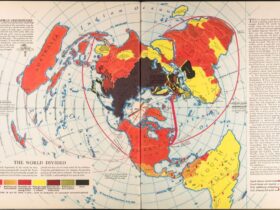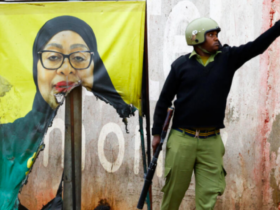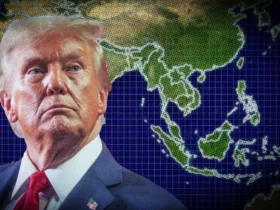Europe
Brexit is delayed… again
The United Kingdom and the European Union approved the postponement of the beginning of the UK’s exit process. It was originally scheduled for the end of March 2019. However, the British Parliament did not approve Prime Minister Theresa May’s version of the plan. Now, there are three important dates for Brexit: April 12 and May 22, as approved by EU leaders. June 30 is the deadline for the postponement, as requested by Teresa May. However, it is possible that in the absence of support for the EU’s exit plan by parliament, a new date will again be set.
On March 27, Theresa May said she is ready to resign if Parliament approves her deal. If this happens, it could lead to a long-lasting political crisis in the UK: any politician who becomes head of the country when the Brexit process starts is unlikely to hold out for long.
France: protests continue
In France, Yellow Vest protests continued throughout March. In response, authorities approved a number of legislative changes that prohibit rallies and punish protesters out of court. Since March 23, protests on the Champs Elysees and in the center of a number of major cities have been banned. Nevertheless, the radicalism of the demonstrators has not subsided. The Yellow vests continue to be a serious problem for Emmanuel Macron’s government.
Netherlands: the triumph of populism
On March 21, Dutch media reported that the right-wing populist party Forum for Democracy had achieved major success in elections to provincial (state) parliaments. Party representatives will immediately receive 12 mandates in the upper house of parliament, which has 75 seats.
The ruling government coalition led by Prime Minister Mark Rutte lost most of their seats in Upper House of parliament. A government crisis may result from the election results: the triumph of the populist party demonstrates growing disenchantment with the liberal politics of the ruling elite.
Serbia: Protests against Vucic
On March 3 in Serbia, thousands of demonstrators took to the streets of Belgrade in the largest manifestation against Serbian President Alexander Vucic and his government in 3 months. On March 16, demonstrators seized the building of Serbian state radio and television stations. Protests are ongoing since the beginning of the year and combine patriots and nationalists as well as liberals and leftists. The main goal of the protests is the resignation of President Alexander Vucic. He is charged with plotting to accept Kosovo’s independence for the sake of EU membership, as well as corruption and pressure on the opposition.
Vucic himself in a dangerous position, his half-hearted policy has lost him the support of patriots in Serbia, without gaining the support of pro-Western forces. It is very likely that after he agrees with the West’s plans for Kosovo, the elites will have him ousted with the help of the protestors.
Eurasia
Kazakhstan: transition of power
On March 19, President Nursultan Nazarbayev of Kazakhstan announced his resignation. He will retain the post of head of the country’s security council and leader of the ruling Nur Otan party. Nazarbayev’s successor is Kasym-Zhomart Tokayev. Previously, Tokayev was the speaker of the upper house of parliament. In April 2020, Kazakhstan will host new presidential elections.
Nazarbayev is the oldest leader remaining from the former Soviet Union, having been in power for 29 years. Nazarbayev’s departure increases the risk that Islamists and nationalists will be able to take advantage of the transition of power. Their actions may adversely affect the security of the country. The security of Kazakhstan is important to the security of all of Central Asia, as well as nearby China and Russia.
On the other hand, the experience of the transition of power in Kazakhstan, if successful, could be a model for other former Soviet republics.
Azerbaijan and Armenia: leadership meets
On March 29, the President of Azerbaijan Ilham Aliyev and Armenian Prime Minister Nikol Pashinyan held their first official talks in Vienna. Both leaders and the OSCE Minsk Group co-chairs gave the meeting a positive assessment.
Aliyev and Pashinyan agreed on humanitarian measures to resolve the Nagorno-Karabakh conflict, reaffirmed the need for a cease-fire and the improvement of a direct communication mechanism.
At the same time, the positions of the parties did not change in regard to a final settlement: the President of Azerbaijan spoke in favor of de-occupying the regions of Azerbaijan captured by Armenians and against including the unrecognized Nagorno-Karabakh Republic in the negotiation process. On the other hand, the next day, after the meeting with Aliyev, Pashinyan held a telephone conversation with the head of the separatist Armenian government of Nagorno-Karabakh, Bako Sahakian, and confirmed his commitment to the idea of including him in the negotiation process.
Yerevan’s commitment to this idea undermines the efforts at dialogue. However, the very fact that talks were held between the new leadership of Armenia and Azerbaijan should be viewed positively and reduces risks of a dangerous flair-up in the region.
Elections in Ukraine
On March 31 in Ukraine, the first round of presidential elections was held. Comedian Vladimir Zelensky garnered the most votes in the first round. His opponent in the second round will be the current president Petro Poroshenko.
Despite the fierce election struggle, the foreign policy program of the participants in the second round of elections is not fundamentally different. Both candidates advocate closer cooperation with the US and the EU and support NATO membership and European integration.
Near East
US: recognition of the Golan Heights as Israeli
On March 25, US President Donald Trump signed a decree recognizing the Golan Heights as part of Israel. From the point of view of international law, the Golan Heights is a part of Syria occupied by Israel in 1967.
This event occurred during a visit of Israeli Prime Minister Benjamin Netanyahu to the United States. Donald Trump was guided by several considerations when making this decision:
- He supports Netanyahu in his election campaign. Early legislative elections will be held in Israel on April 9, 2019. Netanyahu was involved in corruption scandals which threatened his victory in the elections. For Trump, Netanyahu is a priority partner in Israel, which is why he has gone out of his way to help him achieve victory.
- Trump’s pro-Israel gesture aims to garner the support of the Israeli lobby in the United States on the eve of the US presidential elections of 2020.
The US’ actions were condemned by Turkey (including President Recep Erdogan himself) and Arab countries, as well as China, Russia and even France. The recognition of the Golan Heights as Israeli creates a new hotbed of tension in the Middle East, heightening the contradictions between Muslim countries and Israel. The fact that the United States recognizes the annexation of parts of Syria creates a dangerous precedent: it can be seized by separatist movements, including those associated with the Kurdistan Workers’ Party, which threatens Turkey, Iraq and Iran.
On the other hand, the pro-Israel actions of the United States are weakening their influence on societies throughout the Islamic world. The fact that only hours after Turkey condemned the recognition of the Golan Heights as part of Israel at the highest level reinforces it as a leader in the Muslim world… But the US also has allies among the Arabs, such as Saudi Arabia, Egypt and Jordan.
Turkey and Iran: a joint strike on Kurdish militants
On March 12, Turkish Interior Minister Suleyman Soylu stated that Turkey and Iran began a joint operation against the PKK on the southeast border. On March 18, the fact of the operation was confirmed by Turkish President Recep Erdogan. He stressed that it was the first of its kind and that he hoped further missions would follow. Iranian media, however, has denied the country took part in the strike. Nonetheless, the statements of the Turkish side testify in the very least to Ankara ’s interest in joint actions with Tehran for the sake of common security.
Turkey: Local Elections with Global consequences
On March 31, local elections were held in Turkey. The Turks elected mayors of cities and local officials in 81 municipalities, including the country’s largest cities: Izmir, Adana, Bursa, Ankara and Istanbul. In the elections, two main political forces opposed each other: “The People’s Alliance”, which included President Erdogan’s “Party of Justice and Development” and the “Nationalist Movement Party” and the “The National Alliance”, which was created by “Republican People’s Party” and the conservative “Good Party.”
According to the voting results, “The People’s Alliance” won in 41 of the 81 municipalities of the country but lost such cities as Ankara and Istanbul. President Erdogan however, declared victory for his party.
Analysts regard this election as the first test of electoral support by President Erdogan since he was re-elected in June 2018. The results show that this support has generally been preserved, despite economic difficulties. At the same time, there are problems that Turkey’s leadership will need to resolve. On the other hand, sharing responsibility for the country with the opposition in hard times may be a positive outcome, as they will share in the country’s failures in the eyes of the people.
Asia
India: anti-satellite weapons
On March 27, for the first time in history, India launched an anti-satellite missile which successfully shot down a satellite in space. The successful attack was announced by Prime Minister Narendra Modi. The target – an Indian satellite – was located a few hundred kilometers above the Earth.
Some analysts have suggested that the reason for this step were purely political and domestic. Prime Minister Narendra Modi seeks to strengthen his support in society and demonstrate the power of the Indian Army, after clashes with Pakistan in February. The Indian army was shown to have a serious technological advantage in comparison to their rival. However, the demonstration of the Indian army’s power indicates the transfer of the arms race into space at the level of the US, China and Russia.
China in Italy: Contrary to Washington and Brussels
On March 22, Chinese President Xi Jinping, for the first time in ten years, arrived on an official visit to Italy. The main theme of Xi Jinping’s talks with Prime Minister Giuseppe Conte was Italy’s decision to join the Chinese megaproject “One Belt – One Road.” Italy seeks to actively participate in the project looking to make infrastructure and economic advances: at the beginning of March, the Istat statistics service announced that Italy’s GDP had already been falling for two quarters in a row. National debt reached 133 percent of GDP — the highest figure among the eurozone countries after Greece.
The US actively admonished Italy’s participation in the “One belt – One road” project. Days before the visit at the EU summit, EU leaders discussed countering Chinese influence in Europe. However, Rome decided to pursue a path of sovereignty. The rhetoric about China’s influence did not stop German chancellor Angela Merkel, President of France Emmanuel Macron and the head of the European Commission Jean-Claude Juncker from meeting Xi Jinping after Conte. This demonstrates the interest of the EU in the development of trade and economic relations with China, regardless of their talking points. Another European country – Luxembourg – signed an accord with China’s on the Belt and Road Initiative (BRI) as well.
China’s success demonstrates that the balance of power on a global scale is shifting from Washington to Beijing.
North America
USA: missiles instead of democracy
On March 12, the US Department of Defense presented a draft military budget for a record $718 billion. Among the Pentagon’s priorities: countering Russia and China, developing new types of weapons (including hypersonic weapons and autonomous and unmanned combat systems), and strengthening the nuclear potential of the United States. The increase in funding for the Pentagon correlates with a reduction in funding for the Department of State (by almost 25%).
The US Department of State and the US Agency for International Development (USAID) will receive $ 40 billion. This is 12.3 billion less than the funds allocated last year. This decision once again demonstrates that the current Presidential Administration is pursuing a realist approach in terms of international relations, preferring hard power to democracy and negotiation.
The Mueller investigation: no collusion
On March 21, US Attorney General William Barr announced the completion of Special Prosecutor Robert Mueller’s investigation. Since 2017, Mueller investigated possible collusion between Trump’s team and Russia during the US presidential election in 2016. On March 24, the US Department of Justice published a report on the outcome of the inquiry.
The document states that the probe did not find any connection between Russia and representatives of the team of the 45th US President. In addition, the commission of the special prosecutor stressed that it did not reveal any actions by the American leader, which could be regarded as obstruction of justice.
The results of the investigation demonstrate the end of Trump’s opponents years of accusations that Trump had illegally worked with a foreign power to win the presidential race. This is very good news for Trump, as it significantly increases his chances for re-election as president of the United States in 2020.
South America
USA + Brazil – a New Alliance
On March 17, Brazilian President Jair Bolsonaro arrived in the US. This was his first foreign visit to participate in a bilateral meeting since he took office on January 1. Trump and Bolsonaro agreed to cooperate on a range of issues. Both leaders support regime change in Venezuela and pledge to counter leftist regimes in the region. Donald Trump also spoke in favor of strengthening strategic military-political cooperation between Brazil and Washington and even suggested that Brazil may join NATO. Brazil, in turn, offered the US access to its space center, located near the equator.
The rapprochement between the United States and Brazil casts doubt on Brazil’s participation in the BRICS alliance and makes it one of the main agents of American politics in Latin America.
Venezuela: increased sanctions pressure
On March 19, the US Treasury Department imposed sanctions against the Venezuelan state mining corporation, allegedly “for illegal gold trading.” Three days later, BANDES controlled by the Venezuelan government and affiliated banks fell under sanctions.
Thus, taking into account the previously imposed sanctions against the state oil company, the United States has imposed sanctions against all of the main Venezuelan sources of income. Their main aim is regime change and the United States does not intend to concede.
In addition, United States Special Representative for Venezuela Elliott Abrams on March 29 announced that sanctions may be imposed on countries supporting Venezuela. Among those countries he mentioned were Turkey, Russia and China.
Africa
Sudan: government reshuffle
On March 13, a new government was appointed in Sudan. The new government of Sudan was announced on Wednesday against the background of ongoing protests and a sharp economic crisis in the country. The decision was approved by President Omar al-Bashir. The head of the Ministry of Internal Affairs, ministers of finance and economic planning, as well as oil and gas were changed.
New permutations demonstrate the desire of the Government of Sudan to improve the situation in the country and to pacify the protests trying to change the country’s leadership.
Protests in Algeria: Bouteflika resigns
On March 1, up to 800 thousand protesters took to the streets in cities throughout Algeria to protest against the continuation of the 20-year rule of President Abdelaziz Bouteflika. On March 8, more than 1 million people took to the streets in the capital of Algeria against the ruling Front for National Liberation Party, the government and President Bouteflika. On March 15, yet another protest involving over a million people was held. On March 26, the Chief of the General Staff of the Algerian Armed Forces, Ahmed Gaid Salah, demanded President Bouteflika be declared incapable of ruling, and for him to be dismissed in accordance with Article 102 of the Constitution of the country. On April 1, Bouteflika announced that he would leave the post by the time his mandate expired on April 28.
However, it is not yet clear whether new elections will be held on April 18, as previously planned, something the opposition insists on. The ruling party, the “Front for National Liberation,” and the military are more likely to appoint transitional leadership so as not to lose control of the country against the wave of protests.
There are many pro-French and pro-American elements in the Algerian opposition. Therefore, theoretically, a possible change in the leadership of Algeria may lead to the pro-Western reorientation of the country. Activation of Islamist groups is also possible. The ethnic factor is also important. One of the forces involved in the protest is the opposition party the “Front of Socialist Forces.” Its base of support is the Kabili people (Algerian Berbers).
Oceania
Anti-Muslim terror attack in New Zealand
On March 15, right-wing terrorist Brenton Tarrant shot 50 people in two mosques in Christchurch, New Zealand. The killer broadcast his slaughter on social media network Facebook. The terrorist attack demonstrated that a rise in radical sentiment is becoming a reaction to the strengthening of Muslim communities in Western countries. The ideology of tolerance implanted by liberal elites has not solved the problem, on the contrary, attempts to force pro-migration narratives on society naturally lead to the radicalization of white supremacist terrorists.
Another geopolitical conclusion that can be drawn from this terrorist act is that Turkey is perceived as the leader of the Muslim world in Western countries. Brenton Tarrant published a manifesto where a lot of attention was paid to Turkey; he even called for an assassination attempt on Recep Erdogan.
















Leave a Reply